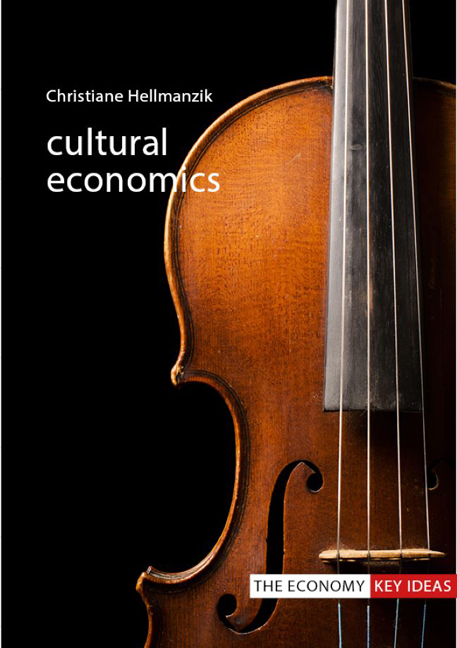Book contents
- Frontmatter
- Contents
- Acknowledgements
- 1 Introducing cultural economics
- 2 Markets, prices and agents
- 3 Society and culture: public provision and institutional aspects
- 4 Demand for culture
- 5 Artists, superstars and creativity
- 6 Quality in the arts and culture
- 7 The organization of cultural industries
- 8 The internet’s impact on cultural sectors
- 9 Globalization’s impact on cultural sectors
- 10 Conclusion
- References
- Index
6 - Quality in the arts and culture
Published online by Cambridge University Press: 20 December 2023
- Frontmatter
- Contents
- Acknowledgements
- 1 Introducing cultural economics
- 2 Markets, prices and agents
- 3 Society and culture: public provision and institutional aspects
- 4 Demand for culture
- 5 Artists, superstars and creativity
- 6 Quality in the arts and culture
- 7 The organization of cultural industries
- 8 The internet’s impact on cultural sectors
- 9 Globalization’s impact on cultural sectors
- 10 Conclusion
- References
- Index
Summary
Quality is a tricky topic in the arts and culture. In essence, in this chapter we will explore economists’ answers to the following questions. Is there such a thing as objective quality in culture? And, if so, how do we know what constitutes a good artwork? A good book? A good dance? Personal and diverse though preferences may be, there also seem to be some agreed measures of commercial as well as critical success. And, given that these are usually measureable and observable, this is often what economists turn to when looking to quantify quality.
Now, of course, one could discuss at length whether commercial success is a marker of high quality. There are many instances when audiences and critics have been divided: consider the success of the book Fifty Shades of Grey, for example, or Hirst's shark in a tank. Both were critically panned, but, if millions of readers were willing to invest their time reading or collectors were willing to pay large sums to own the tank, they could not possibly be wrong – could they?
After all, who is to judge anybody's taste in the arts? In many ways, markets are liberal and morally neutral, because consumers can simply vote with their feet or wallets by choosing to buy certain products and services. However, there is a vast strand of literature in philosophy dealing with aesthetics. The key questions here relate to how people form aesthetic appreciation and how individual preferences are aligned and negotiated in arriving at a common understanding of aesthetics. After all, there are universal ideals, such as the “golden ratio” in art, according to which a painting is composed, or the aesthetic ideal of symmetry.
Since the eighteenth century philosophers such as Alexander Gottlieb Baumgarten, David Hume, Edmund Burke and Immanuel Kant have occupied themselves with the nature of aesthetical judgements and how these judgements differ from rational or moral judgements. According to Kant, we can say that an aesthetic judgement has two characteristics: it combines the subjective, private assumption that something is beautiful with the claim that this assumption is generalizable.
- Type
- Chapter
- Information
- Cultural Economics , pp. 73 - 86Publisher: Agenda PublishingPrint publication year: 2020



